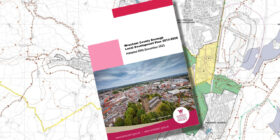RNLI offers safety advice as lifeguard patrols end across Wales

The Royal National Lifeboat Institution (RNLI) is offering safety advice to beachgoers as its lifeguard patrols come to an end across Wales.
Yesterday marked the end of the peak season for RNLI lifeguards in Wales and the charity is offering lifesaving safety advice to people visiting the coast during the winter months.
Whitesands Beach in Pembrokeshire will continue to be patrolled on weekends only up until October half term.
Chris Cousens RNLI Water Safety Lead for the region said:
‘As the season finishes for RNLI lifeguards in Wales, we’re asking people to continue to take care and be aware of the dangers.
‘If you visit a beach outside of the lifeguard season, never go alone. It’s vital that you have company who could get help in the event of an emergency. Take note of safety signage at the entrance to the beach which will warn of the local risks and hazards, and if possibly speak to someone local who might be able to provide advice.
‘Always check the weather conditions and tide times and consider your capabilities, if in doubt it is better to stay dry and watch the sea than take the risk.
‘Always carry a means of contact such as a mobile phone, if you get into trouble or see anyone else in difficulty call 999 and ask for the Coastguard.
‘We’re aware that cold water dipping is becoming increasingly popular. We strongly advise that you should never do this alone. As we get further into the winter months and the temperature continues to drop, the risk of cold-water shock will increase. Make sure you do not stay in the water for a prolonged period, and that you have means of warming up afterwards.
‘If you get into trouble in the water, Float to Live. Tilt your head back with ears submerged and try to relax and control your breathing. Use your hands to help you stay afloat and then call for help or swim to safety if you can.’
The winter months bring harsher conditions that can pose great risk to those visiting the beach. Bigger waves and stronger winds increase the likelihood and strength of rip currents.
Should you find yourself stuck in a rip current:
– Don’t try to swim against it or you’ll get exhausted.
– If you can stand, wade don’t swim.
– If you can, swim parallel to the shore until free of the rip and then head for shore.
– Always raise your hand and shout for help.
Despite the coming absence of RNLI lifeguards on the beaches, the RNLI would like to remind the public that RNLI lifeboats are a 24-hour search and rescue service with 238 stations situated around the British Isles. When you call 999 and ask for the Coastguard, they dispatch the nearest lifeboat which will come to your aid.
Spotted something? Got a story? Email [email protected]











